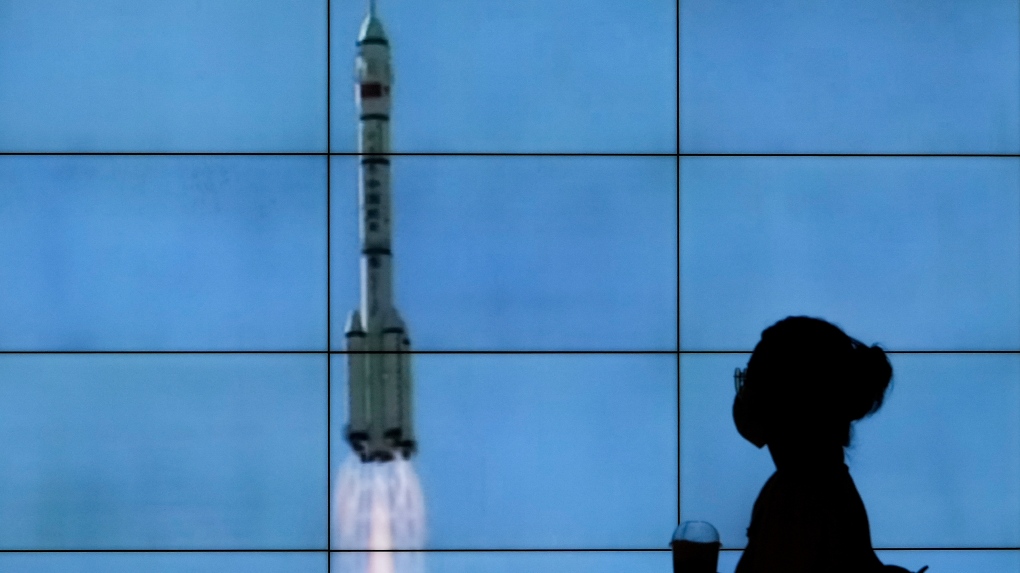
Quebec nurse had to clean up after husband's death in Montreal hospital
On a night she should have been mourning, a nurse from Quebec's Laurentians region says she was forced to clean up her husband after he died at a hospital in Montreal.
A piece of debris created by Russia's recent anti-satellite test came within striking distance of a Chinese satellite Tuesday, in an encounter the Chinese government has called "extremely dangerous."
The Russian debris came as close as 14.5 meters (approximately 48 feet) from the satellite, according to the Space Debris Monitoring and Application Center of the China National Space Administration.
If a collision did occur, it could've caused a "hypersonic shockwave," said Jonathan McDowell of the Harvard-Smithsonian Center for Astrophysics, who explained "it came close enough that it easily could have hit."
"A piece big enough to be tracked like this, it hits at 12,000 miles per hour, and you get a hypersonic shockwave going through the satellite that reduces it to shrapnel, to confetti," he said.
McDowell however, describes China's assertion the two objects came within such a specific distance as "nonsense because there's no way they can know it that accurately."
Based on publicly available U.S. space tracking data, McDowell says the two objects could have come within anywhere from a few hundred yards to a few inches of colliding.
"The fact that it's still there means it didn't hit, but that's the only way you know that," McDowell said.
Russia destroyed one of its own satellites last November in a direct-ascent anti-satellite missile test which has been condemned by U.S. President Joe Biden's administration as dangerous and irresponsible.
At the time, U.S. Space Command said the test generated "more than 1,500 pieces of trackable orbital debris and will likely generate hundreds of thousands of pieces of smaller orbital debris."

On a night she should have been mourning, a nurse from Quebec's Laurentians region says she was forced to clean up her husband after he died at a hospital in Montreal.
A North Bay, Ont., lawyer who abandoned 15 clients – many of them child protection cases – has lost his licence to practise law.
Members of the Bank of Canada's governing council were split on how long the central bank should wait before it starts cutting interest rates when they met earlier this month.
Brad Marchand scored twice, including the winner in the third period, and added an assist as the Boston Bruins downed the Toronto Maple Leafs 4-2 to take a 2-1 lead in their first-round playoff series Wednesday
Cuba's foreign affairs minister has apologized to a Montreal-area family after they were sent the wrong body following the death of a loved one.
Mounties in Nanaimo, B.C., say two late-night revellers are lucky their allegedly drunken antics weren't reported to police after security cameras captured the men trying to steal a heavy sign from a downtown business.
The federal government's proposed change to capital gains taxation is expected to increase taxes on investments and mainly affect wealthy Canadians and businesses. Here's what you need to know about the move.
Canada's Deputy Prime Minister Chrystia Freeland was among the 1,700 delegates attending the two-day First Nations Major Projects Coalition (FNMPC) conference that concluded Tuesday in Toronto.
The daughter of a New Brunswick man recently exonerated from murder, is remembering her father as somebody who, despite a wrongful conviction, never became bitter or angry.

A property tax bill is perplexing a small townhouse community in Fergus, Ont.
When identical twin sisters Kim and Michelle Krezonoski were invited to compete against some of the world’s most elite female runners at last week’s Boston Marathon, they were in disbelief.
The giant stone statues guarding the Lions Gate Bridge have been dressed in custom Vancouver Canucks jerseys as the NHL playoffs get underway.
A local Oilers fan is hoping to see his team cut through the postseason, so he can cut his hair.
A family from Laval, Que. is looking for answers... and their father's body. He died on vacation in Cuba and authorities sent someone else's body back to Canada.
A former educational assistant is calling attention to the rising violence in Alberta's classrooms.
The federal government says its plan to increase taxes on capital gains is aimed at wealthy Canadians to achieve “tax fairness.”
At 6'8" and 350 pounds, there is nothing typical about UBC offensive lineman Giovanni Manu, who was born in Tonga and went to high school in Pitt Meadows.
Kevin the cat has been reunited with his family after enduring a harrowing three-day ordeal while lost at Toronto Pearson International Airport earlier this week.
 A woman wearing a face mask is silhouetted as she walks by a TV screen showing a live telecast of the Long March-2F Y12 rocket launch in China on Thursday, June 17, 2021. (AP Photo/Andy Wong)
A woman wearing a face mask is silhouetted as she walks by a TV screen showing a live telecast of the Long March-2F Y12 rocket launch in China on Thursday, June 17, 2021. (AP Photo/Andy Wong)